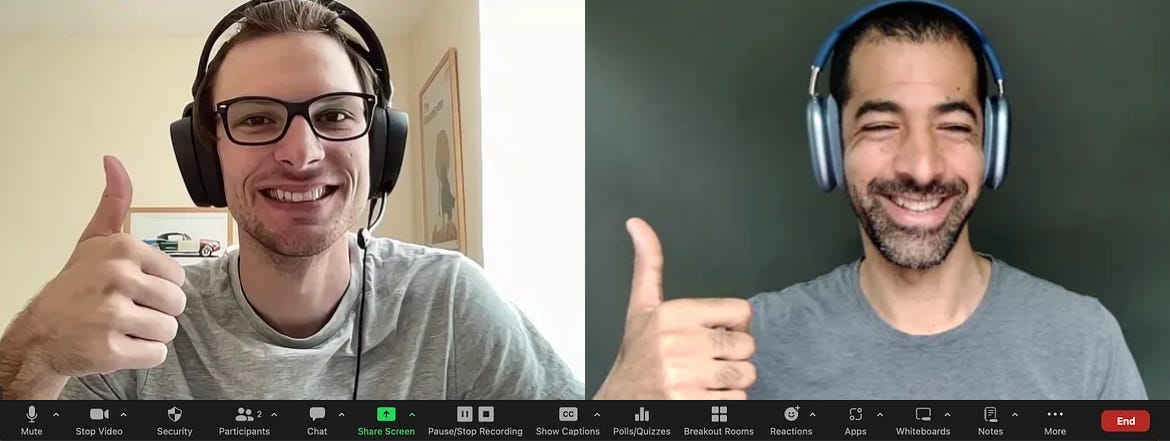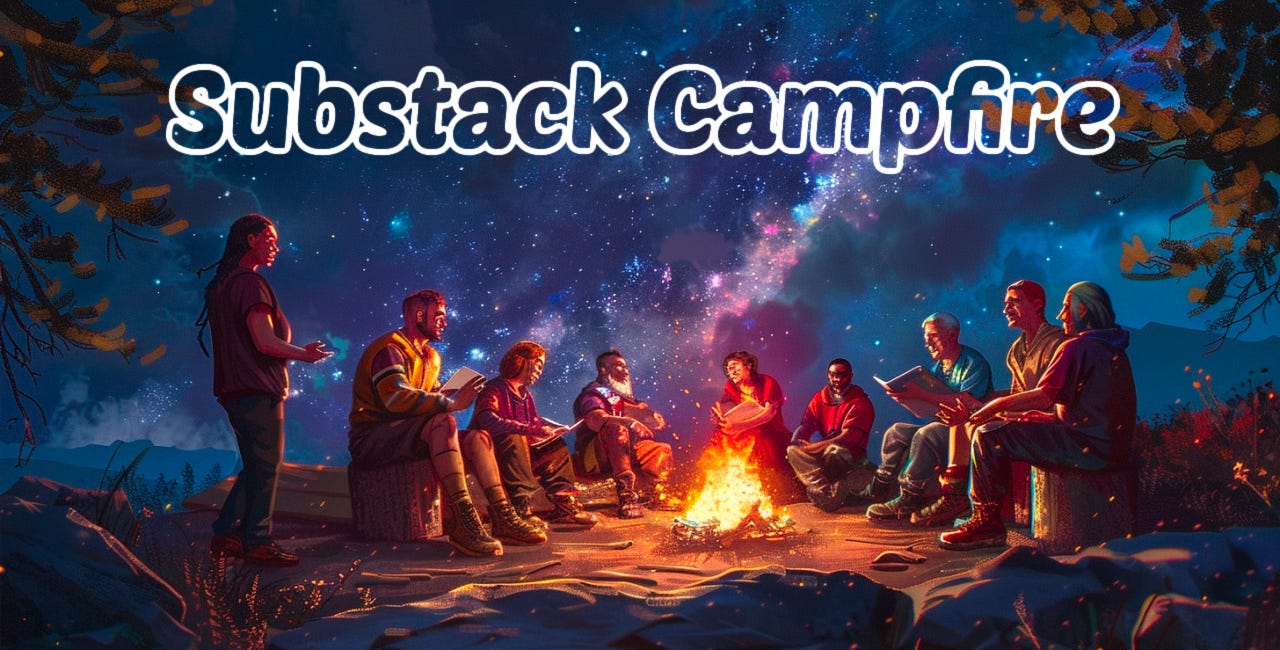About The Campfire 🪵🔥 ⛺
Recently my friend
asked me something:“Tom, would you want to do a daily writing cohort on Substack?”
At first, my mind screamed, “NO!”
I had already run a LinkedIn writing cohort for two and a half years. I wanted a break. But Michael is the type of guy anybody would dream to collaborate with.
Michael has…
Been published in Harvard Business Review, Fortune, Inc., Entrepreneur, and Forbes.
Built his newsletter,
, to over 100,000 subscribersHelped dozens of students 100x their readership, get published in top publications like Scientific American and Forbes, and win major multimillion dollar deals through writing.
And that’s just the tip of the iceberg.
Furthermore, his vision for the program really meshed well with mine.
He had ideas like:
Writing daily Notes for 4 weeks straight.
Giving students 30 writing prompts.
Fostering community first instead of virality.
Making the goal about enjoying yourself while writing!
If I could’ve shushed him during his pitch with my index finger, I would’ve.
“Say less, Michael, I’m in!”
I loved it. Words can’t describe how much I loved it.
You see, I’d just left LinkedIn after writing there for six years. I ran 30-day writing cohorts there called LinkedIn Sprints, which hundreds of writers joined us for.
But something didn’t feel right on LinkedIn.
It didn’t feel like home.
So, in August of 2023 I made my way to Substack. It was slow moving for me at first, and I’d get maybe 200-300 new subscribers per month if I was lucky.
Then I discovered Notes.
After posting five Notes with minimal traction, one Note on January 11 got 200 likes within 24 hours. It drove about 30 new subscribers in a single day.
Then a Note published on January 22nd got 400 likes within a week. I got 50 subscribers in a single day from that one.
‘What is this?’ I thought.
On LinkedIn I would never get traction like this.
From January to May, I drove close to 8,000 subscribers to my newsletter.
Then Michael Simmons came knocking on my door.
I’d known of Michael from my days on Medium, but we never actually connected.
But on Substack, he liked a few Notes of mine and sent me a private message. It was hard to ignore the orange checkmark next to his name. 😄
We hit it off. Over the next few weeks, we talked about Substack, social media, writing, and pickleball. Can’t leave out pickleball.
Then he asked me if I wanted to do this cohort.
Michael’s not a stranger to cohorts himself. He runs a year-long cohort program called the Thought Leader School, where he teaches people how to write viral articles online. He’s run it six times since 2018.
As we started ideating a Substack program, we realized many writing cohorts miss the mark.
You see, other writing cohorts are about:
Going bonkers viral
Following rigid templates
Sharing your expertise
The problem is…
It’s not very fun to follow a template, is it?
It’s not fun forcing yourself to write every day like you're running a marathon
It’s not fun to be a content marketer
And the truth is Michael and I have never used templates. We’ve had a lot of success as writers, but it was always a byproduct. Our core drive that got us to start writing and to keep writing for years was always having a process that made us feel like a kid in the candy store rather than a marathon runner.
I love writing because it helps me process emotions and grow…
Michael loves writing because it gives him the permission to deeply explore his curiosities and then write about them…
In the past, we hadn’t written about how important designing a process for learning and enjoyment was. We thought it was just our quirky process.
But on Substack we each decided to write more about it, and found that not only were we not alone, we were among kindred spirits on Substack.
So we asked ourselves…
What if there was a cohort that threw all these ideas in the trash?
What if there was a cohort where you got to write whatever you wanted for 4 weeks straight?
What if you tossed off the shackles of your niche, and going viral, and got to engage in a 4-week creative writing experience?
What if we went beyond growth hacking where you comment on people’s posts just to get traction and focused on authentic relationships and community first?
To tell your story? To let your hair down? To introduce yourself to this wonderful Substack community as your real self?
This is what Substack was made for!
To be a beacon of realness in this social media wasteland. I’m looking at you, LinkedIn.
There’s a reason that Michael and I connected so easily on Substack, when we didn’t on other platforms. It’s because Substack is so great at fostering community through features like Notes, Recommendations, Directories, Cross-Posting, Post Co-Authoring, and Direct Messages. These are all features that aren’t present on platforms like Medium, thus we never connected there despite both of us writing on Medium for years.
Michael and I have fairly different styles. My writing is brash, emotional, and conversational. His writing is thoughtful, well-researched, and polished. He spends days and weeks writing a single article. I spend one afternoon.
We really felt we could offer a program for a wide range of writers because of our different backgrounds.
A true collaboration.
So, what to call this cohort?
We wanted something that invoked community.
Retreat? Nah. Tribe? Too overused. Fellowship? Too Tolkien-y.
Then it hit me. What about a campfire?
Fire helped us humans do so many things—like cook food—making it more digestible. This gave us more energy to do other things. Ultimately our brains grew, our skills grew, and our thoughts grew, too.
Fire made us smarter.
But, the greatest thing fire gave us will surprise you..
Storytelling.
Fire gave us storytelling.
Our ancestors convened around the fire to talk, tell stories, laugh, and cry.
Some anthropologists posit that storytelling is what made it possible for human beings to form complex societies, religions, countries, and even sports teams.
The stories we tell ourselves about our country, for example, create a bond between us. A bond so strong that nations and empires can rise from it like a growing flame.
In short, stories are the most powerful thing in the world.
And that’s exactly what we want to celebrate with you, on Substack.
Storytelling.
We wanted to create a campfire for Substack writers to tell their stories. To laugh together. To discuss ideas. To cry.
Storytelling is the foundation of this program.
All 4 weeks are designed to help you tell a story about yourself.
Fire also gave us community.
And community is the second pillar of this challenge.
We want to get everybody around the campfire.
We want you to tell your story.
We want to create a tribe (even though that word is overused).
We want to teach you. We want to examine Notes and articles together. We want to get your take on why a piece of writing did well.
That is our mission as we start this Substack Campfire.
Love. Joy. Expression. Authenticity.
Not virality, or personal brands, growth hacking, content marketing, or niches.
These values are something Michael and I hold dear to our hearts. We want this to be fun for you.
We also wanted this to be unapologetically “Substack.” We wanted to align with the values of this platform, and use all the tools available to us to host the entire program right here on Substack.
Everything will be here. Our community, our chat, our discussion threads, our recordings, our lessons—it will all be hosted on Substack.
Our next program starts on July 1.
To join us for all 4 weeks of the writing challenge, become a paid subscriber to this newsletter. To see all we’re offering in the program (group calls, live lessons, chats, etc.) take a look at our info page:
What's Included With The Substack Campfire
Overview The Substack Campfire is the first writing challenge specifically designed to help you break through on Substack Notes. Created by Tom and Michael, the four-week writing challenge is…



